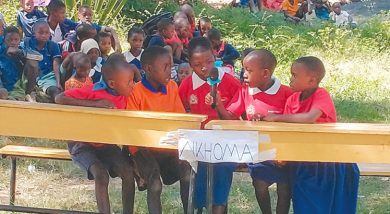AIP rolls out Friday
The Ministry of Agriculture has said the selling of this year’s Affordable Inputs Programme (AIP) farm inputs will be launched on Friday, with the fertiliser price maintained at K15 000.
Minister of Agriculture Sam Kawale disclosed this at a press briefing held yesterday in a Smallholder Farmers Fertiliser Revolving Fund of Malawi (SFFRFM) warehouse in Lilongwe.
He said they have started distributing 16 300 metric tonnes (MT) of fertiliser ahead of the launch in Traditional Authority Kaluluma in Lilongwe to be presided by President Lazarus Chakwera.
The minister disclosed that the total fertiliser required for the programme is 149 025MT of which 122 000MT is being procured through current budget.
Said Kawale: “The 16 300MT is from carry-over stocks which we are distributing right now, 6 000MT to be procured through support from International Fund for Agriculture Development under Crisis Recovery Initiative and 5 200MT being procured from a Japanese grant.”
He said the carry-over stock’s distribution started last week in districts including Nkhotakota, Chitipa, Mangochi, Mzimba, Kasungu and Rumphi.

“We are starting to dispatch 16 385 metric tons mostly to hard-to-reach areas. In our warehouses, we also have 25 015 metric tons of fertilisers under collateral arrangement, which will be dispatched soon after payment,” the minister said.
Kawale further pointed out that contracted suppliers are also keeping fertilisers in their warehouses totalling 67 041MT.
“In summary, total fertilisers in the country held by the 13 contracted suppliers is at 108 441.45MT which is about 73 percent of our requirements.
“All fertilisers are expected to be in the country before the planting rains, because a lot of fertilisers are coming into Malawi through our borders, including Songwe Port, which was rarely used in the past seasons,” he added.
The minister attributed the delays in securing the fertiliser to funding, but said that Treasury has released K103 billion.
“I am pleased to inform you that K59 billion was funded a few months ago and K44 billion was funded last week Friday, which is going to cover the payments so that we can have all the 149 000 MT,” he said.
In addition to fertiliser, government is also subsidising seeds by paying K3 500 per five-kilogramme pack and distributing goats to 9 750 families at a reduced price of K15 000.
The minister also confirmed 1.5 million farming families will benefit from AIP in the 2023/24 growing season, a drop from 2.5 million last year and 3.7 million in 2021.
On the pricing, he explained: “Government has decided to maintain the farmer contribution applied last season despite the increase in prices, where the selling price of a fertiliser bag averages K70 000.”
Kawale, who was accompanied by Minister of Information and Digitalisation Moses Kunkuyu, said the targeted beneficiaries are productive farmers.
Meanwhile, the Parliamentary Committee on Agriculture has described the AIP reforms as pointless, warning they will hurt those that have been left out.
“If they say social cash transfer, how many people are they targeting and what kind of assistance are they planning to provide? What criteria did they use to identify those productive farmers?
“There are families who 100 percent rely on farming for their food to survive. What will those people do? Because a productive farmer is someone who has moved from relying on farming merely for food to one who can harvest extra for sale,” said committee chairperson Sameer Suleman.
Government has allocated K109.8 billion for implementation of AIP in the 2023/24 budget. Out of which K102 billion is for fertiliser purchases, K6.5 billion for seed, K585 million for goats purchases and K67 million for operations, according to the Ministry of Agriculture.
The previous AIP programmes were marred by poor network that affected verification of beneficiaries in databases and lack of transportation that forced some members of Parliament to use the input using their personal means.
The Ministry of Agriculture has, however, assured that they have devised new interventions that will prevent a recurrence of the hiccups.





